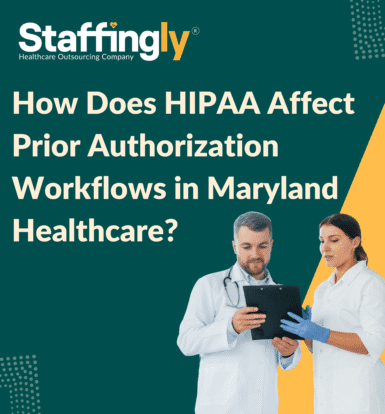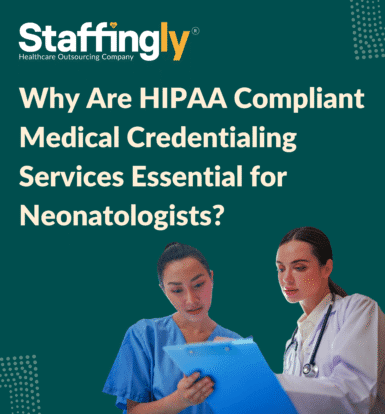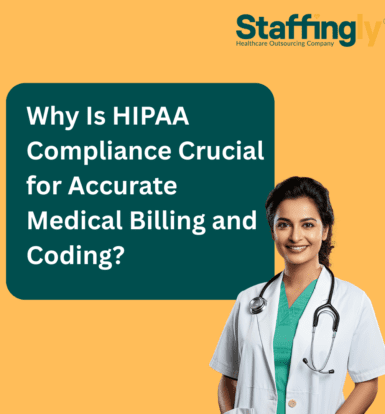On-Demand Outsourcing BPO Services for Healthcare Providers With 24/7 Coverage!
Save up to 70% on staffing costs!
Browse Specialty Staffing Services
How Does HIPAA Affect Prior Authorization Workflows in Maryland Healthcare?
Prior authorization (PA) is a crucial step in healthcare that helps control costs and ensures patients receive the right treatments. However, managing PA can be complicated—especially when healthcare providers must also comply with HIPAA impact on prior authorization Maryland, the federal law that protects patient privacy combined with state-specific regulations. In Maryland, where state laws add another layer of privacy requirements, healthcare providers face unique challenges in balancing efficiency and compliance. Key Takeaways HIPAA requires strict protection of patient information

Why Are HIPAA-Compliant Medical Credentialing Services Essential for Neonatologists?
When it comes to caring for the tiniest and most vulnerable patients, neonatologists carry a profound responsibility. But their specialized expertise in newborn care isn’t the only demand of the profession — navigating the maze of medical credentialing is just as critical. Credentialing ensures that neonatologists meet the required standards to deliver care in hospitals, NICUs, and through insurance networks. However, the complexity of the process — spanning licensure, hospital privileges, payer enrollment, and regulatory compliance — can quickly overwhelm

Why Are Revenue Cycle Management Services Important for Hospitals?
Hospital finances in 2025 aren’t just complicated—they’re under pressure. With rising costs, staffing shortages, and tighter compliance rules, keeping a hospital financially healthy is about more than delivering excellent care. It’s about ensuring every dollar earned from that care is efficiently captured and collected. That’s why Revenue Cycle Management for Hospitals 2025 has become essential. No longer a backend billing task, RCM now plays a central role in driving operational efficiency, improving cash flow, and maintaining long-term financial resilience. For

What Are the Best Medicare and Medicaid Billing Tips for Private Clinics?
Mastering Medicare and Medicaid billing tips for private clinics is essential for maximizing reimbursements and staying compliant. It’s not just about submitting claims—it’s about understanding the rules, staying updated with changes, and having the right systems in place to ensure timely, accurate payments. Here’s a practical guide to streamline your billing process, reduce claim denials, and keep your clinic on track. Key Takeaways: Staying current with Medicare and Medicaid changes is crucial to avoid claim denials and delayed reimbursements. Technology-driven

Revenue Cycle Management for Large Healthcare Organizations: Optimizing Financial Performance and Patient Experience
In the ever evolving landscape of healthcare, large healthcare organizations face unique challenges in managing their revenue cycles effectively. Revenue Cycle Management (RCM) encompasses the entire financial process from the point of patient registration to the final payment for services rendered. The importance of RCM cannot be overstated, as it directly impacts the financial health of a healthcare organization, ensuring that providers are compensated for the care they deliver while maintaining regulatory compliance. Effective RCM also improves the patient experience

Why Are Medical Credentialing Services Essential for Dermatologists?
In the intricate world of dermatology, specialists do more than treat skin—they also safeguard nail and hair health, perform delicate cosmetic procedures, and diagnose complex disorders. While patient care is the top priority, dermatology practices often face a hidden burden: administrative tasks, especially medical credentialing. Credentialing is critical not only for regulatory compliance but also for maintaining high-quality care, ensuring timely payments, and building a trusted practice. Efficient, precise credentialing is no longer just a formality—it’s a pillar of success

What Role Does Prior Authorization Play in Insurance Reimbursement?
Prior authorization might seem like just another administrative task, but for healthcare providers, it’s often the line between getting reimbursed and getting denied. As insurance companies tighten their rules, navigating this process has become more critical than ever—especially when it comes to protecting revenue and keeping the patient experience smooth. Key Takeaways Prior authorization ensures that services are medically necessary and covered by insurance, thereby helping providers avoid denials. In fact, insurance companies rely on it to manage costs and

Why Is HIPAA Compliance Crucial for Accurate Medical Billing and Coding?
In the healthcare industry, accuracy in medical billing and coding is paramount to ensuring proper reimbursement, smooth operations, and, most importantly, the protection of patient information. However, achieving this accuracy goes beyond just numbers and codes—it involves strict adherence to standards, particularly HIPAA compliance. The Health Insurance Portability and Accountability Act (HIPAA) serves as the backbone of data privacy and security in the healthcare field. When it comes to medical billing and coding, HIPAA’s rules help safeguard sensitive patient information,
 Book a Demo to Build Your Team Today!
Book a Demo to Build Your Team Today!


 Read Case Studies
Read Case Studies 



 Virtual Medical Assistants
Virtual Medical Assistants



